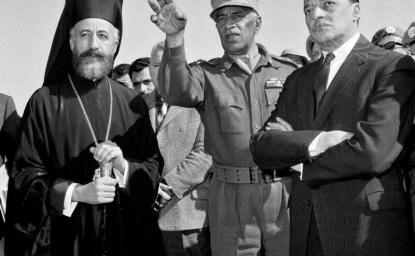CWIHP is pleased to announce that A. Ross Johnson has been named a Senior Scholar at the Wilson Center until October 2008.
His current research projects include:
1. Role and Impact of Radio Free Europe/Radio Liberty (RFE/RL); Lessons from the Cold War
RFE/RL was arguably one of the most important and successful policy instruments of the United States during the Cold War. Drawing on untapped archival sources, oral histories, and personal experience, this study is examining the organization, policies, and impact of RFE/RL.
The study is informed by earlier treatments of RFE/RL history, especially
Sig Mickelson, America's Other Voice; the Story of Radio Free Europe and Radio Liberty (1983), and Arch Pudington, Broadcasting Freedom (2000). Drawing on these and other earlier works, this study focuses on key elements of RFE/RL's history that have not been examined comprehensively to date.
The study examines the origins and intended role of RFE/RL in the context of U.S. national security strategy, with particular attention to the role of the Central Intelligence Agency in covertly organizing and funding RFE/RL from 1949 to 1971. This analysis is based largely on CIA records, which the author is currently researching in accordance with Section 4.5 of Executive Order 12958. No other researcher has utilized these materials to date.
The study pays special attention to the endgame – the policies adopted within RFE/RL in the late 1980s as it became clear that the Soviet Empire was crumbling. This analysis draws on the corporate and broadcast archives of RFE/RL, now at the Hoover Institution, on the author's personal experience as Director of Radio Free Europe in 1988-1991, and on the oral testimony of other RFE/RL officials.
The study also focuses on the impact of the broadcasts in Eastern Europe and the USSR. It draws on the testimony of former dissidents, such as Vaclav Havel. It is based primarily on material from Communist-era archives that document regime perceptions of RFE/RL, treatment of its information for internal purposes, jamming, and reprisals against RFE/RL's secret contributors and listeners. This section of the study draws on the proceedings of the October 2004 conference on the impact of Western broadcasting sponsored by the WWC Cold War International History Project and the Hoover Institution.
The study concludes with an analysis of the factors that accounted for RFE/RL's effectiveness – it was arguably the U.S.'s most cost-effective instrument to fight the Cold War – and the lessons of success that can inform contemporary efforts by the United States to "win the hearts and minds" of foreign elites and populations, especially in the Muslim world.
The author is currently conducting research for this study in the RFE/RL archives at the Hoover Institution, in CIA records at the Center for the Study of Intelligence, in the archives of the German Foreign Office, in East German (Stasi) records on RFE/RL, and in other Communist-era regime archives on RFE/RL.
2. Disintegration of Yugoslavia – Endgame
Articles and lectures focused on the future of Kosovo and Bosnia-Herzegovina
3. What Future for United States International Broadcasting?
Participant in a study group examining this issue, which is neglected in the many recent reviews of U.S. public diplomacy
4, Publications from the October 2004 Hoover-Woodrow Wilson Center conference on Cold War Broadcasting Impact.
Editor of volumes of collected conference papers and of relevant primary documents, to be published by the Central European University Press.

Cold War International History Project
The Cold War International History Project supports the full and prompt release of historical materials by governments on all sides of the Cold War. Read more




